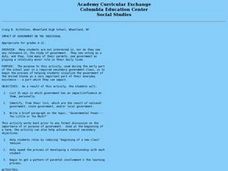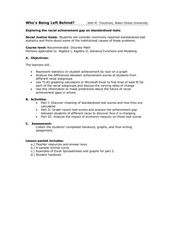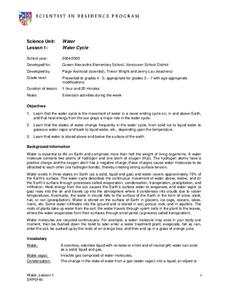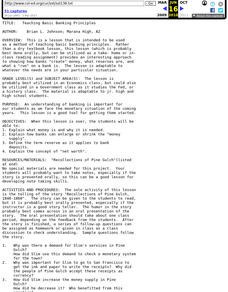Curated OER
Impact of Government on the Individual
Learners make a list of how the government impacts their lives and discuss it with their parents. In this government lesson plan, students also write a paragraph about what they discussed.
Curated OER
Seasons
Students explore the four seasons. In this seasons lesson, students create a class tree. Students make leaves for the tree for each of the seasons. Students mark their paper into fourths and draw a picture of the seasons.
Curated OER
Reasons for Seasons
Students track photoperiod (daylight hours) over time and predict how daylight change during different seasons. This helps build their understanding that ever-changing daylight is the driving force for migrations and all other seasonal...
Curated OER
Social Issues
Young scholars examine issues that affect Americans every day and create a documentary regarding a selected topic. In small groups they select an issue, conduct Internet research, and create an information sheet. Students write interview...
Curated OER
Life On The Oregon Trail
Learners investigate the concept of the Oregon Trail. They conduct research using a variety of resources. The class divides into different groups to take a different aspect of the research. Then the groups present the findings to the...
Curated OER
Party Time
Students design a budget to plan for a class party. In this problem solving activity, students devise a budget with a limit of fifty dollars for a class party. Students discuss and estimate the amount of money needed for food and...
Curated OER
Sweet-Talkers
Students investigate what is being sold to them. In this media awareness lesson, students visit selected websites to take a closer look at advertising marketed at them. Students discuss the implications of marketing geared toward children.
Curated OER
Who is Being Left Behind?
Students investigate scores as they relate to race. For this algebra lesson, students analyze standardized scores and how race can affect these scores. They plot their findings on a graph and draw conclusions.
Curated OER
Ancestors in the Americas: Lesson One
Students are introduced to the characteristics of documentaries and making films. Individually, they write their own proposal for an idea of a documentary making sure to identify the point of view of which it is going to be filmed. ...
Curated OER
Operation Mexfly
Pupils research information about pesticides. Students discuss the history of the Mexican fruit fly. They experiment to discover malathion concentration levels in organisms. Pupils explore the effect of toxins at the top of the food...
Curated OER
What's In A Name
Second graders read Chrysanthemum by Kevin Henkes. They then discuss where various names come from. They create a individualized biopoem and publish it on word processing software. Their poems are compiled into a class book and presented...
Curated OER
Water and Ice
Students explore water and ice. In this 3 states of matter lesson, students work with a partner to observe, illustrate, and describe the characteristics of an ice cube in a cup. The ice cube is observed again in 15 minutes and changes...
Curated OER
Book Discussions via Web 2.0
Students discuss books they read via web 2.0. and create a wiki and podcast that will present the audience with their select a book by a popular teen author and write a short script about the book. Students and type the critic of the...
Curated OER
Annotating Poetry
Use text marking and highlighting to explore the structure of a poem. After listening to Allan Ahlberg read "Please Mrs. Butler," learners locate stanzas and patterns on their copy of the poem using the text marking technique. Class...
Curated OER
An Imaginary Creature And Then Using Describing And Action Words for a Creative Writing Exercise
You have to collect lots of materials (boxes, bags, toilet paper rolls, etc.) for this activity to work successfully. After modeling how to create an imaginary creature out of the collection of recycled materials, let your class search...
Curated OER
The Right Stuff
Studentsare introduced to the Pythagorean Theorem by exploring right triangles and the squares built on each side. They apply the Pythagorean Theorem to real-world problems. Students u se informal and nonformal arguments of proof (i.e.,...
Curated OER
Celebration of Trees
Second graders listen to various, grade appropriate stories about trees. They create their own construction paper trees and discuss the importance of trees to the ecosystem and the importance of taking care of them. Finally, 2nd graders...
Curated OER
Sundials and Shadows - What Can They Teach Us About Seasons?
Students collect and analyze data relating to seasonal changes. They view a video, research web sites and build a sundial to collect their data.
Curated OER
Let's Travel
Students engage in Internet search. They find answers to questions concerning an assigned country. They create a video presentation about a foreign country. They design a display about the foreign country.
Curated OER
Louisville's Best Field Day Park
Students create a survey to hand out to determine the best field day park. Using their local area, they select five parks, if possible, that meet the criteria and calculate the distance and estimated time travel. They use this...
Curated OER
Water Cycle
Young scientists explore Earth elements by conducting an experiment. They define water vocabulary terms such as condensation and precipitation. In addition, they conduct a water experiment in which they build a terrarium, so they can...
Curated OER
Teaching Basic Banking Principles
Students listen to the story, "Recollections of Pine Gulch, 1840-1860" to determine how banks "create" money, what reserves are, and what a "run" on a bank is.
Curated OER
Teaching Basic Banking Principles
Students explore basic banking principles and the value of money as they probe into the instructional activity. The case of Gus Mahler is examined as students discover the money making dealings of the banking industry.
Curated OER
Good Deeds Reap Rewards
Students recognize the good deeds of their classmates. In this self-esteem activity, students participate in a reward program for doing a good deed. Students get prizes for outstanding behavior.

























